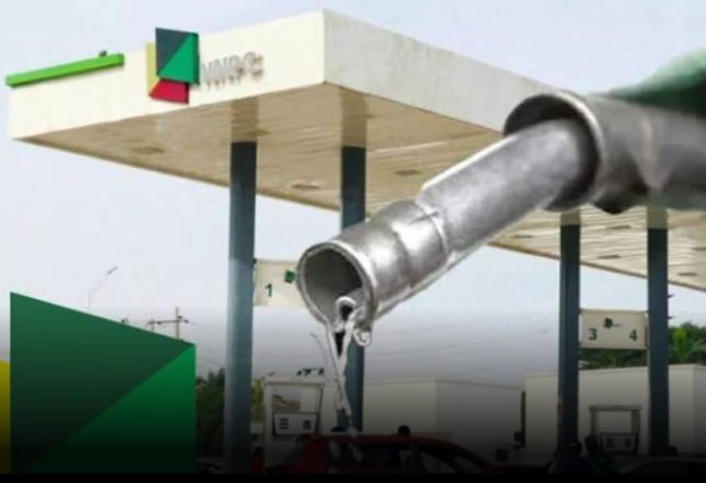
NNPCL Slashes Petrol Price by N10 as Dangote Refinery Boosts Supply

In what appears to be a glimmer of relief for Nigerians weary of skyrocketing fuel costs, the Nigerian National Petroleum Company Limited (NNPCL) has announced a reduction in the pump price of petrol, cutting it by N10 per litre. The new price adjustment, which took effect on Saturday, has brought the cost of Premium Motor Spirit (PMS) down from N955 to N945 per litre at NNPCL retail outlets, signaling a potential turnaround in the country’s recent fuel supply challenges.
The price slash comes amid reports that petrol supply from the Dangote Refinery — a facility once touted as the game-changer in Nigeria’s energy sector — has finally begun to stabilize after weeks of disruption and distribution bottlenecks. Motorists in major cities like Abuja, Lagos, and Port Harcourt, who have endured long queues and fluctuating prices, welcomed the adjustment as a rare piece of good news in an economy burdened by inflation and rising living costs.
In Abuja, several NNPCL stations, including those in Gwarimpa and Wuse Zone 4, were among the first to implement the revised pump price, attracting a noticeable increase in vehicular traffic as drivers rushed to take advantage of the change. The ripple effect was immediate, as other independent and major marketers, including Eterna and Conoil, swiftly adjusted their prices to match the new benchmark of N945 per litre.
For weeks, Nigerians had faced mounting frustrations over fuel scarcity and the erratic pricing of petrol. The situation, aggravated by supply delays from the Dangote Refinery — which recently began large-scale operations — and import constraints, had triggered a cascade of challenges for transporters and businesses. Many public transport operators had hiked fares to cope with the increased cost of petrol, pushing commuters deeper into economic hardship.
However, industry insiders say the latest development signals an improvement in fuel distribution across the country. “The refinery is now releasing products more steadily, and we are seeing the results in both availability and price,” an NNPCL insider disclosed. “It’s still early, but the system is becoming more predictable, and that’s a good sign.”
The Dangote Refinery, which is the largest single-train refinery in the world with a capacity of 650,000 barrels per day, has been at the center of public expectations for months. Nigerians had hoped its operations would drastically reduce reliance on imported fuel and end the recurrent fuel crises that have plagued the country for decades. Yet, teething issues around supply logistics, pricing models, and foreign exchange constraints delayed the anticipated impact.
Saturday’s price adjustment by the NNPCL marks one of the first visible signs that those early challenges are gradually being resolved. Observers believe it could also serve as a confidence booster for the public, which has grown skeptical about the promised benefits of local refining.
Despite the welcome price drop, experts warn that the reprieve might be short-lived. Analysts point to the recent approval by President Bola Ahmed Tinubu of a 15% import tax on petrol and diesel — a move the government says is aimed at stimulating local production and discouraging import dependency. While the policy aligns with the administration’s broader economic reform agenda, market watchers fear it could offset the current gains and drive pump prices upward again in the coming weeks.
Energy analyst Adetokunbo Sanni explained that while improved supply has helped lower prices, the new import tax will likely have a delayed but significant effect. “It’s a delicate balance,” he said. “Right now, local supply is cushioning the market, but if the importers start factoring in the new tax, we might see prices creep up again. The only way to sustain this reduction is for the Dangote Refinery and other local producers to maintain consistent output.”
For everyday Nigerians, though, the focus remains on immediate relief rather than long-term projections. In Lagos, motorists described the N10 reduction as “small but meaningful.” One commercial driver, identified as Musa Ibrahim, said, “Even if it’s just N10, it helps. At least it shows something is improving. Before now, we were hearing only bad news about fuel.”
Another motorist in Abuja expressed cautious optimism. “I just hope it continues to go down. Transport is expensive, food is expensive — everything is expensive. Any reduction, no matter how small, gives people hope,” she said as she filled her tank at an NNPCL outlet.
Fuel marketers are also cautiously adjusting to the new dynamics. According to the Petroleum Retail Outlets Owners Association of Nigeria (PETROAN), the price drop could help normalize market behavior after weeks of panic buying and hoarding. “When people see that prices are coming down instead of going up, they stop hoarding, and that stabilizes supply,” a PETROAN official said.
Nevertheless, not everyone is convinced that the current relief is sustainable. Some critics argue that the government’s lack of a transparent pricing mechanism continues to make the sector vulnerable to volatility. They note that while the deregulation policy was meant to allow market forces to determine prices, frequent government interventions and unclear cost structures have made it difficult to predict or trust the system.
This latest adjustment by NNPCL also raises fresh questions about how pricing decisions are made in a supposedly deregulated market. Although NNPCL operates as a limited liability company, it remains wholly government-owned and is still perceived as the de facto price setter in Nigeria’s downstream petroleum sector.
For now, Nigerians appear willing to accept any sign of relief, even if temporary. Long queues have thinned out in several parts of Abuja and Lagos, and reports from Kaduna, Kano, and Enugu suggest that fuel deliveries have become more consistent over the past few days. Transport operators say they are monitoring the situation before deciding whether to adjust fares downward, a move many commuters are eagerly awaiting.
The government, on its part, has continued to emphasize the importance of supporting local refining efforts and reducing dependence on fuel imports. In a recent statement, the Ministry of Petroleum Resources reiterated that the success of the Dangote Refinery and other modular refineries would determine the long-term stability of Nigeria’s energy sector. “The objective is to ensure energy security through domestic refining,” the ministry said, “and every policy we introduce is geared toward achieving that goal.”
As the dust settles on the latest price revision, one thing is clear: the dynamics of Nigeria’s fuel market are shifting, slowly but noticeably. Whether the current price cut is the beginning of a downward trend or just a temporary pause before another spike remains to be seen. But for millions of Nigerians grappling with the weight of economic uncertainty, Saturday’s announcement offered something rare — a reason, however brief, to exhale.
In a country where the price of petrol often dictates the rhythm of daily life, NNPCL’s decision to cut prices by N10 may not solve every problem, but it has reignited a flicker of hope that perhaps, just perhaps, the tide is beginning to turn.


